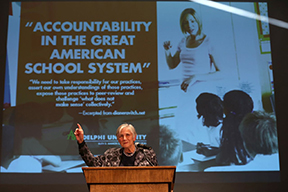Renowned educator and author Diane Ravitch, Ph.D., spoke about the state of public education in America.
 |
Diane Ravitch, Ph.D., began her April 3 lecture, “Accountability in the Great American School System,” by asking an overflow crowd of several hundred at Adelphi University to raise their hands “if there are any teachers in the room.”
A sea of hands rose in the Thomas Dixon Lovely Ballroom from an audience eager to hear one of America’s foremost authorities on education. In a lecture that often elicited applause, Dr. Ravitch did not disappoint.
“Reformers say education in America is declining, is obsolete and has seen no progress in decades. They say bad teachers are the problem and that charter schools are a silver-bullet solution,” Dr. Ravitch said. “Those reformers pay no attention to poverty. They treat teachers as a greedy self-interest group, and they say school boards have too much discussion and debate. What they’re proposing is not reform, just a step-by-step privatization of the American education system.”
 |
Dr. Ravitch, a research professor of education at New York University, author and internationally renowned scholar, spoke forcefully at Adelphi about the current state of public education in America and the ongoing battles at school board meetings and in legislatures about how to improve our schools. She provided her audience with much food for thought, as she typically does online in the widely read dianeravitch.com.
“Dr. Ravitch’s writing commits a fearless truth to public education,” said Jane Ashdown, Ph.D., dean of the Ruth S. Ammon School of Education. “She is to be commended for resisting intellectual popularity contests.”
Before delivering her remarks in the Ruth S. Ammon Endowed Lecture, Dr. Ravitch fielded questions on issues dealing with contemporary and historical education in a class for master’s degree candidates taught by Carl Mirra, Ph.D.
“Dr. Ravitch has been at it a long time and she draws upon her experiences to show the pitfalls of how data is used today in evaluating educators,” said Dr. Mirra, associate professor and the director of the Childhood Education Program at the Ammon School of Education. “She is one of the most important educational commentators questioning contemporary educational practices, speaking about the common core, the evaluation system and the charter school movement.”
At a time when test scores and high school graduation rates are the highest in American history, Dr. Ravitch said, opponents of public education still claim our system is failing. She asserted that through vouchers, charter schools, unfair measuring sticks for teacher evaluation and the unrelenting appetite of politicians in Washington for standardized testing, American public education is under siege from vested corporate interests seeking to better their profits instead of the well-being of students.
On the issue of education reform, Dr. Ravitch made it clear she considers teachers far more qualified than politicians to produce the right answers.
“We cannot afford to lose our dedicated exemplary teachers; they know more about the inside of a classroom than legislators do,” she said to applause. “Real reform will come by working with civic leadership for our schools to not just train workers, but also to enrich our citizens to trust, respect and collaborate. We have to treat every child as a unique and untapped talent.”
Dr. Ravitch assailed No Child Left Behind (NCLB) and Race to the Top (RTTT), the major education reforms of President George W. Bush and President Barack Obama, respectively, saying both initiatives wrongly suggest that standardized test scores are the only way to measure the progress of students and teachers and that test scores should increase every year without fail, regardless of the children or the communities in which they live.
“The testing regime is based on carrots and sticks where kids only learn how to take tests, not gain knowledge,” Dr. Ravitch said. “The government is so detached, their legislation [NCLB and RTTT] characterizes any school without 100 percent proficiency by 2014 as a failure, and we all know that there is no nation in the world with 100 percent proficiency.”
Dr. Ravitch offered her own solutions to improve education in America, including:
- An end to merit pay
- A legitimate method of evaluating teachers
- Balanced curricula in classrooms
- A greater emphasis on early childhood education
- Reduced class sizes that would provide students with a safe environment where they could be creative and broaden their horizons
For further information, please contact:
Todd Wilson
Strategic Communications Director
p – 516.237.8634
e – twilson@adelphi.edu